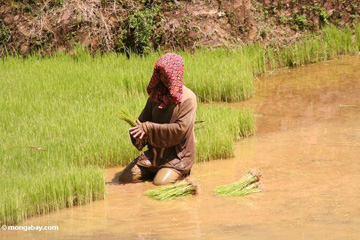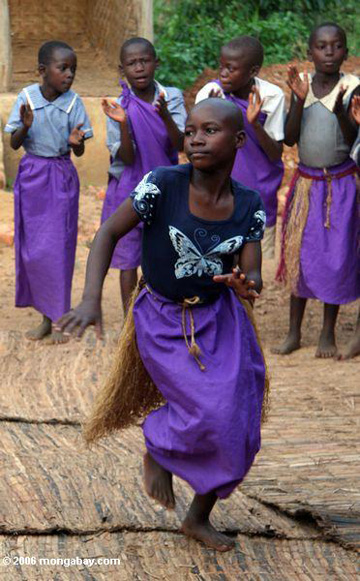As nations from around the world meet at the Convention on Biological Diversity in Nagoya, Japan to discuss ways to stem the loss of biodiversity worldwide, two prominent researchers argue that environmentalists and conservationists need to consider paradigm shifts if biodiversity is to be preserved, especially in developing countries. Writing in the journal Biotropica, Douglas Sheil and Erik Meijaard argue that some of conservationists’ most deeply held beliefs are actually hurting the cause.
“Conservation needs to change. We need to recognize that pragmatic conservation solutions aren’t about black and white, good and evil, or nature versus non-nature. Long-term conservation solutions have to involve comprises, otherwise we will just be wasting our time,” Erik Meijaard told mongabay.com.
Stressing that because conservationists and environmentalists often see ecosystems as either pristine—and therefore worth saving—or degraded—and therefore already lost—they often neglect human-impacted ecosystems that are important for a wide-variety of species. The authors label this the ‘tainted-nature delusion’.
 Woman planting in rice paddy in Sualwesi, Indonesia. Photo by Rhett A. Butler. |
“The tainted-nature delusion is our shorthand for a proposed (subconscious) mental mechanism that makes us dismiss some modified habitats as just too unnatural for us to accept that they have any value,” Douglas Sheil said, adding that “there are real conservation opportunities in modified habitats (obvious in temperate countries but not so widely accepted in the tropics) but so far many are reluctant to engage effectively with these.”
Meijaard, who works in Indonesia with orangutans, and Sheil, who works in Bwindi Impenetrable National Park in Uganda, have both seen firsthand how current conservation attitudes can often ruin partnerships before they start.
“Most of the projects around [Bwindi Impenetrable National Park] relate to foreign concerns to protect the mountain gorillas that tourists can see here,” Sheil says. Local people see some of the benefits of this (tourism etc.), but they are also puzzled that we seem to care so much for the gorillas that they themselves can never afford to see, and that we need them to cooperate despite their striking poverty.”
Sheil adds: “I don’t think people are against conservation, but many are against the type of conservation which we are trying to impose on them.”
Meijaard concurs, telling mongabay.com, “I am battling the tainted-nature delusion in Indonesia on a daily basis. Many conservation-minded people see timber concession and plantations as the great evil, rather than recognizing that these are not just a threat to nature but crucial opportunities to finding lasting solutions.”
 Bwindi orphans group performing traditional dances and songs at the Bwindi Impenetrable National Park in Uganda. Photo by Rhett A. Butler. |
Meijaard, like Sheil, says that conservationist’s paradigms often make them enemies of local people, rather than collaborators.
“I have stopped talking about orangutans when working with local people, because too often they have countered me with the question why Western societies want to invest so much into saving the orangutan (i.e., Man of the Forest in Malay), while they (the People of the Forest) are still suffering. That is a fair question. Can we as outsiders judge whether the life of an orangutan baby is more important than the life of a Dayak child?”
Sheil and Meijaard encourage conservationists to study human psychology both to uncover their own prejudices and delusions, as well as to better understand how to approach working with others.
“Conservation is about how we want the world to be,” Sheil says. That reflects many different factors some of which are subconscious and potentially irrational. As we say in the article some of these subconscious factors may be obstacles, but better to understand them and what can be done to address them (or not) than waste time being ineffective.”
Both Sheil and Meijaard see long-term conservation efforts as untenable without better cooperation between conservationists and locals, as well as the private sector. In other words, conservationists need to stop demonizing those they view as responsible for environmental destruction, but instead work closely with everyone who has a stake in the ecosystem. Even more importantly, conservationists must be willing to stomach striking a deal rather than fighting impossibly for a total victory.
“Compromise will be the key to making conservation acceptable and resilient in the context of the world’s emerging democracies. We have to be pragmatic and realize that we can often win more lasting conservation gains by reconciling conservation needs with other human demands,” Sheil says, adding that, “In the long-term we shall need to be more engaged with local motivations and ensure we can find common-ground. Otherwise conservation is simply a new colonialism and is unlikely to be sustainable.”
“I challenge the easy armchair conservationist in the developed world to come out here and try to better understand what conservation really means. Maybe that way we will arrive at more realistic solutions,” Meijaard says.
In the paper they conclude that better self-knowledge among environmentalists and conservationists would go a long way toward aiding the world’s struggling biodiversity.
“By recognizing our biases and delusions we may become more humble, more willing to form alliances, less likely to judge opponents as morally inferior, and ultimately better able to recognize and achieve viable conservation outcomes,” they write.
CITATION: Douglas Sheil and Erik Meijaard. Purity and Prejudice: Deluding Ourselves About Biodiversity Conservation. Biotropica 42(5): 566–568 2010. doi: 10.1111/j.1744-7429.2010.00687.x
Related articles
Can ’boutique capitalism’ help protect the Amazon?

(10/11/2010) Most companies talk green, but few—almost none in fact—actually walk the walk. Sustainable design company, Ecostasy, not only walks the walk, but actually seeks out among the most challenging places to work: the imperiled Brazilian Amazon. Specializing in hand-crafted products by indigenous groups—such as jewelry, pots, and furniture—Ecostasy seeks to balance smart economics, environmental protection, and community development. Make no mistake, however, Ecostasy is not a non-profit, but a rare and refreshing example of a company truly dedicated to changing the world for the better. “In my mind, a virtuous company does not compromise ethical principles for economic interests. For me, being ethical is comprised of conducting oneself with honesty and responsibility to one’s constituencies (customers, employees, suppliers), society and the environment,” Katherine Ponte, founder of Ecostasy, told mongabay.com in an interview.
Financial crisis pummels wildlife and people in the Congo rainforest
(09/27/2010) Spreading over three central African nations—Cameroon, Central African Republic, and Republic of Congo—the Sangha tri-national landscape is home to a variety of actors: over 150,000 Bantu people and nearly 20,000 pygmies; endangered species including forest elephants and gorillas; and, not least, the Congo rainforest ecosystem itself, which here remains largely intact. Given its interplay of species-richness, primary rainforest, and people—many of whom are among the poorest in the world—the landscape became internationally important in 2002 when under the Congo Basin Forest Partnership (CBFP) conservation groups and development agencies agreed to work together to preserve the ecosystems while providing development in the region.
Into the Congo: saving bonobos means aiding left-behind communities, an interview with Gay Reinartz

(09/23/2010) Unlike every other of the world’s great apes—the gorilla, chimpanzee, and orangutan—saving the bonobo means focusing conservation efforts on a single nation, the Democratic Republic of the Congo. While such a fact would seem to simplify conservation, according to the director of the Bonobo and Congo Biodiversity Initiative (BCBI), Gay Reinartz, it in fact complicates it: after decades of one of world’s brutal civil wars, the DRC remains among the world’s most left-behind nations. Widespread poverty, violence, politically instability, corruption, and lack of basic infrastructure have left the Congolese people in desperate straits.
Why biodiversity is worth saving
(09/23/2010) In recognition of the United Nations’ declaration of 2010 as the ‘International Year of Biodiversity’, the Association for Tropical Biology and Conservation (ATBC) has included a special section on the biodiversity in its September 2010 issue of Biotropica.
Orangutans can survive in timber plantations, selectively logged forests
(09/23/2010) Selectively logged forests and timber plantations can serve as habitat for orangutans, suggesting that populations of the endangered ape may be more resilient than previously believed, reports research published in the journal PlosONE. The study, conducted by a team of researchers led by Erik Meijaard of Jakarta-based People and Nature Consulting International, found roughly equivalent population densities between natural forest areas and two pulp and paper plantation concessions in East Kalimantan, Indonesian Borneo.
Logged forests retain considerable biodiversity in Borneo providing conservation opportunity
(08/12/2010) A new study in the Proceedings of the Royal Society B finds that forests which have undergone logging in the past, sometimes even twice, retain significant levels of biodiversity in Borneo. The researchers say these findings should push conservationists to protect more logged forests from being converted into oil palm plantations where biodiversity levels drop considerably and endangered species are almost wholly absent. Given that much of Borneo’s forests have been logged as least once, these long-dismissed forests could become a new frontier for conservationists.
Nation’s wealth does not guarantee green practices

(08/11/2010) Developing countries are not the only ones that could benefit from a little environmental support. Wealthier countries may need to ‘know themselves’ and address these issues at home too. According to a recent study in the open access journal PLoS ONE, wealth may be the most important factor determining a country’s environmental impact. The team had originally planned to study “country-level environmental performance and human health issues,” lead author Corey Bradshaw, Director of Ecological Modeling and professor at the University of Adelaide, told mongabay.com. Once they began looking at the available indexes, however, they saw the need for a purely environmental analysis.